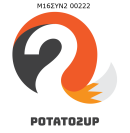
Successful completion of the Potato2Up programme’s activities, which included the Field School and the Scientific Workshop, organized by Geosystems Hellas on 13 and 14 September 2024.

The first day, on Friday 13 September 2024, was dedicated to the Field School.The participants had the opportunity to visit the study area in Perithori, where the producer Andreas Zimbidis presented the potato cultivation process. During the visit, both the problems faced by the crop and the benefits of implementing the Potato2Up project were highlighted. The guests also had the opportunity to observe the processes and learn about production and packaging methods.

On Saturday 14 September 2024, the Scientific Workshop was held at the Hydrama Grand Hotel in Drama. During the conference, the first results of the Potato2Up project and the applications of the innovative technologies tested in the pilot field were presented in detail. The workshop started with the presentation of the project by Dr. Zoe Hilioti, principal researcher of the CERTA/INEV and project coordinator, who referred to the main actions and objectives of the project. Dr. Antonios Zambounis, project coordinator representing ELGO-DIMITRA/IGVFP, then gave a presentation on the improved resistance of potatoes to major fungal pathogens. Anna Papadima from Geosystems Hellas presented the innovative data collection and processing, as well as the development of algorithms for monitoring and predicting the quality of the pilot field.




The programme continued with the financial study of the costs of potato cultivation by Christos Papadopoulos (Speramus IKE), and concluded with the presentation of the producer Andreas Zimbidis, who referred to the experience of potato cultivation in Perithori, the machinery he used and the benefits of the Potato2Up project.
About the Potato2Up project (M16SYNN2 00222)
The project aims to evaluate the effectiveness of a biostimulant and a defence activator in potato cultivation, in order to produce high quality products in an integrated and environmentally friendly system. In this process, remote sensing technologies, such as satellite imagery and multi-spectral UAV imagery, are used to monitor yield and plant health.
Remote sensing enables accurate and rapid monitoring of crops, helping farmers to assess plant health and make data-driven management decisions. At the same time, biological approaches reduce the need for chemical inputs, increasing plant resistance to disease and environmental stresses, ensuring sustainable and quality production.
The project is co-funded by Greece and the European Union through the Rural Development Programme Measure 16 “Cooperation”, Sub-measure 16.1-16.2 under code M16ΣYN2 00222
